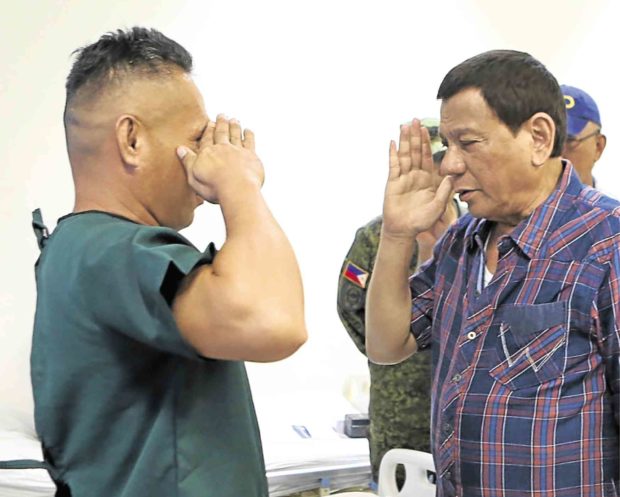Sayyaf attack: 5 soldiers killed

HONORING BRAVERY President Duterte salutes a soldier during his visit in July to troops wounded in a clash with Abu Sayyaf in Sulu.—MALACAÑANG PHOTO
ZAMBOANGA CITY — Five soldiers were killed and at least 23 others were wounded in a clash with homegrown terror group Abu Sayyaf in Patikul town, Sulu province, on Friday.
Col. Gerry Besana, public affairs officer of the military’s Western Mindanao Command, said more than 50 Abu Sayyaf fighters clashed with soldiers from the 41st Infantry Battalion in a clash that lasted more than an hour.
Besana said 15 of the wounded soldiers were airlifted to Zamboanga City for medical treatment.
Besana said the soldiers were searching for hostages taken by Abu Sayyaf when the gunmen attacked them.
“The effort is part of our mission to rescue the remaining hostages,” Besana said.
Article continues after this advertisementAl-Qaida link
Article continues after this advertisementAbu Sayyaf is a homegrown group and a loose alliance of several hundred terrorists formed in the 1990s with seed money from Osama bin Laden’s al-Qaida network.
Friday’s clash was one of the deadliest since an Abu Sayyaf faction joined other foreign and Filipino terrorists in seizing the city of Marawi last year, leading to a five-month battle that claimed more than 1,100 lives.
Abu Sayyaf is now believed to hold “less than 10” hostages, Besana said.
The group is based in some parts of Mindanao, but its members began in 2016 to kidnap sailors in waters between Indonesia, Malaysia and the Philippines.
The terrorists have also raided and taken hostages from resorts in Malaysia.
Ransom
Most of the hostages had been ransomed off for huge amounts of money and several were beheaded, including two Canadian tourists in 2016.
A Dutch bird-watcher kidnapped in 2012 is believed to be among those still in Abu Sayyaf’s hands.
The Dutchman’s Swiss colleague escaped in 2014 after grabbing a kidnapper’s machete and killing him.
The soldiers who survived Friday’s ambush did not see any hostages during the 90-minute clash, Besana said.
In September, a major Army offensive in Patikul led to the killing of seven Abu Sayyaf suspects whose relatives claimed were victims of mistaken identity. —Reports from Julie Alipala and AFP